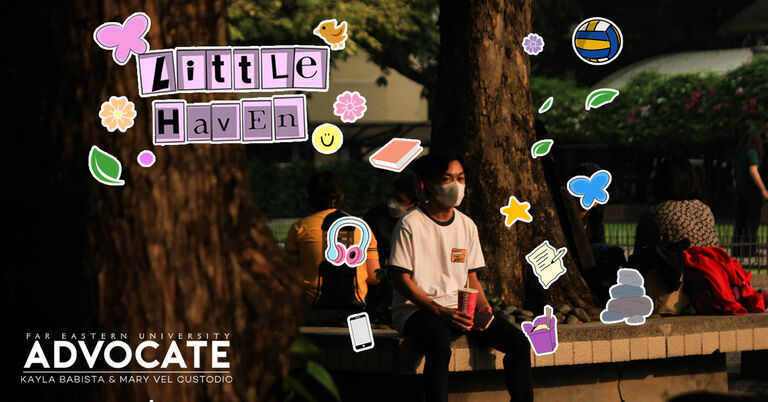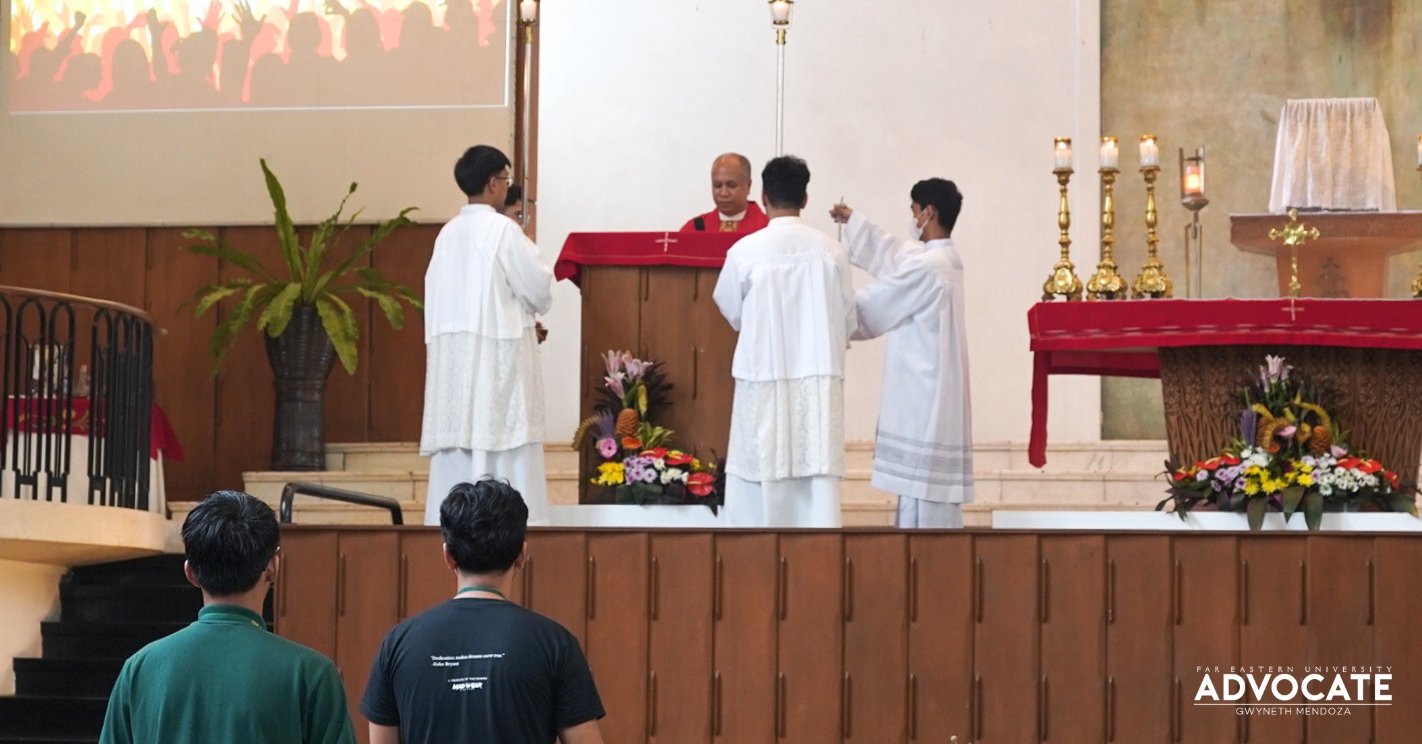
A BudgeTAMian’s Favorite Siomai House: Angkong or Dimsum Treats?
- March 27, 2024 08:46
FEU Advocate
July 27, 2025 17:59
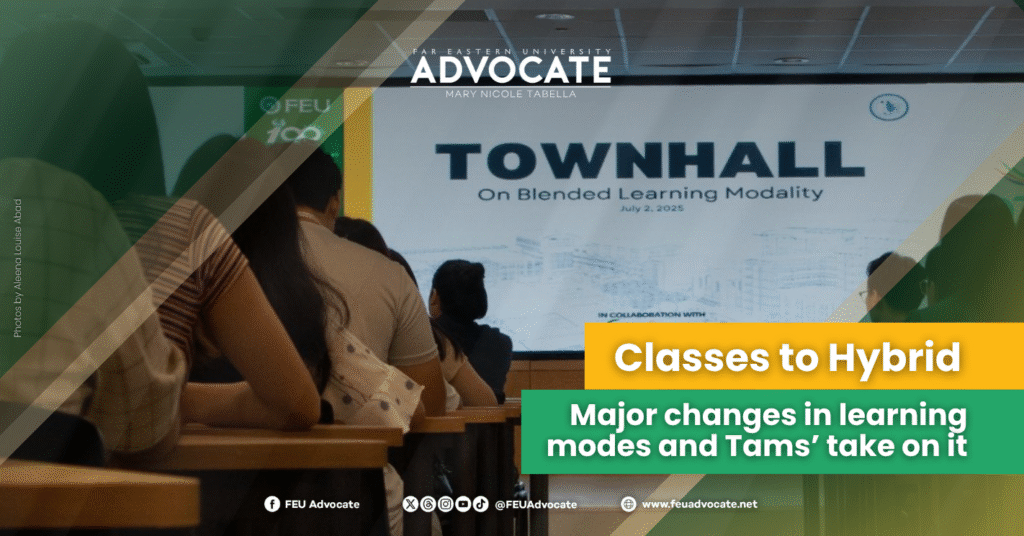
With Far Eastern University’s (FEU) recent introduction of its new hybrid learning model, Tamaraws have to adjust to the changes, causing contrasting opinions to surface regarding the upcoming implementation of the learning modality starting this August.
In a recent TamsCheck survey conducted by FEU Central Student Organization (FEUCSO) from June 23 to 29, out of the 345 student respondents, 43.5 percent were in favor, while 56.4 percent of the population were against the implementation, with a 5.23-percent margin of error.
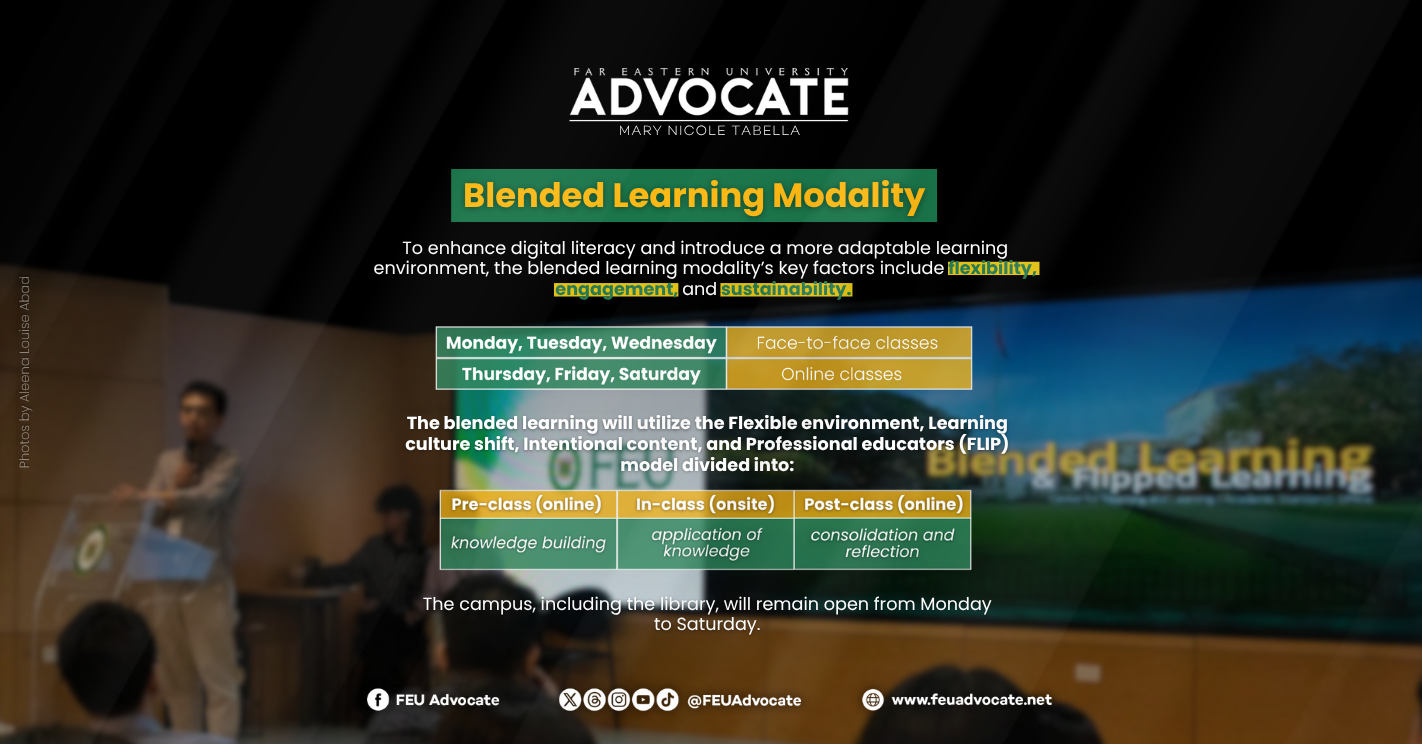
Blended learning modality
According to the FEU learning modality policy shared by the Academic Affairs Office, to enhance digital literacy and introduce a more adaptable learning environment, the blended learning modality boasts key factors including flexibility, engagement, and sustainability.
Moreover, the hybrid modality supports faculty development in crafting a more flexible learning experience while still maximizing available resources and collaborative spaces on campus.
Classes will be divided into a face-to-face setup from Monday to Wednesday, and online sessions from Thursday to Saturday.
To attain effective learning outcomes, this modality will utilize a Flexible environment, Learning culture shift, Intentional content, and Professional educators (FLIP) model wherein activities are divided into three: online pre-class, onsite in-class, and online post-class.
Online pre-class sessions will focus on knowledge building through ‘Know, Want to know, Learned’ charts, Learning Management System quizzes, and other activities that will give students an initial grasp of their lesson.
On the other hand, in-class activities, conducted onsite, will be for the application of knowledge, peer collaboration, and formative feedback.
Lastly, post-class online sessions will target students’ reflection and consolidation of learning to ensure learning outcomes are met.
Similar to the newly introduced blended learning modality among all institutes, the Institute of Arts and Sciences (IAS), Institute of Education (IE), and general education courses implemented independent study (IS) weeks during the previous semester, designating a week every month for online engagements.

Program specifics
The Institute of Tourism and Hotel Management (ITHM), IAS, and IE will implement hybrid classes for the upcoming academic year.
In addition, courses under the Institute of Accounts, Business, and Finance will also adhere to the hybrid set-up except for BS Accountancy, which will still have full face-to-face classes.
For the Institute of Health, Sciences, and Nursing, BS Medical Technology will have laboratory classes until Thursday, while the BS Nursing program will have its own separate modality.
Additionally, there will only be specific courses under the Institute of Architecture and Fine Arts (IARFA) that will have blended classes.
Moreover, there are still ongoing talks regarding the Wellness and Recreation Program (WRP) implementation under the hybrid learning modality.
Online regulations
During online learning, courses and their learning materials will be uploaded and accessed through Canvas, while Microsoft Teams will be utilized as the main platform for communication.
Moreover, in synchronous meetings, cameras of students and respective professors should be turned on, wearing appropriate attires and observing proper decorum.
Students are also encouraged to use background effects using FEU-themed backdrops to be shared by the University.
Meanwhile, recording of attendance on all class days regardless of modality is recommended to professors.
In instances where students do not have access to the necessary devices or are experiencing connectivity issues, they may utilize the e-library or specially designated rooms.
The library is yet to release separate guidelines regarding their online reservation procedure.
Additionally, the University will remain open from Monday to Saturday for students to access needed services.
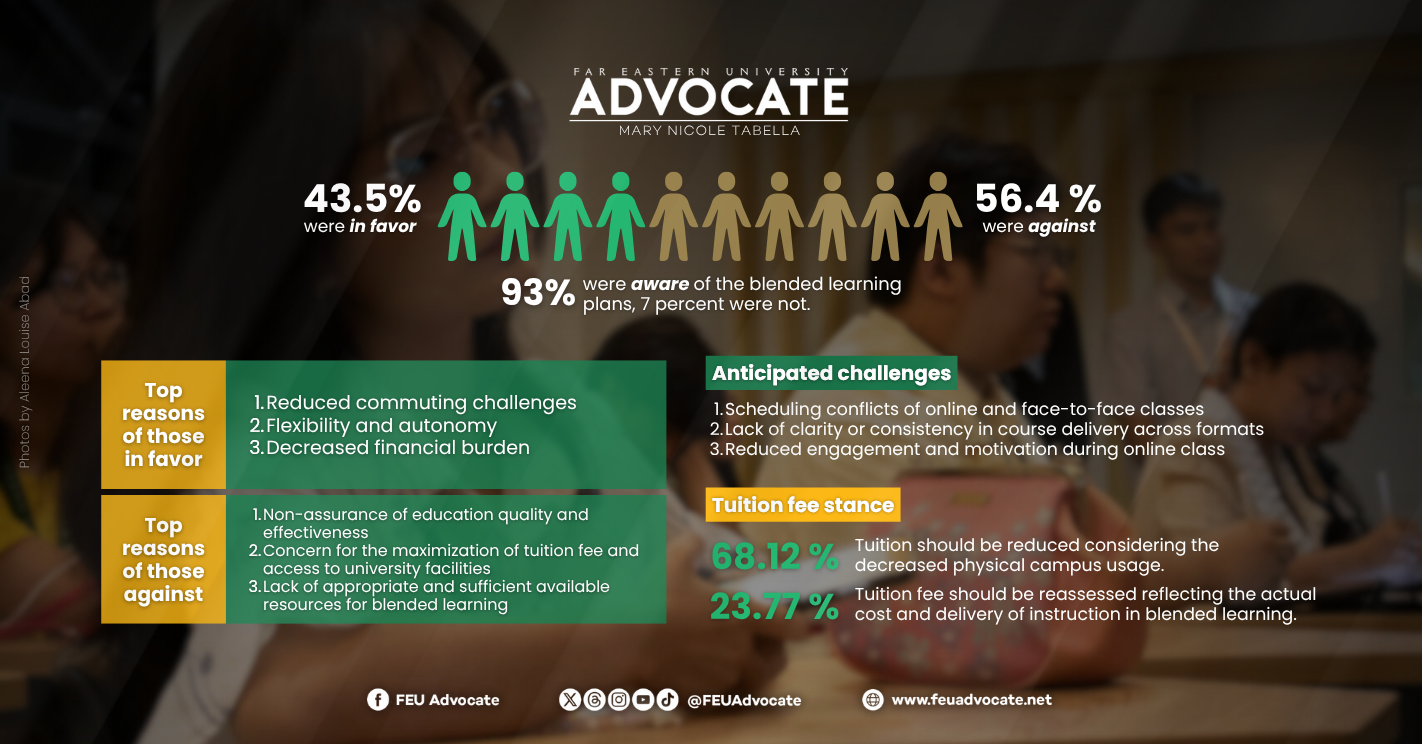
TamsCheck result, student feedback
The recently concluded survey by FEUCSO’s Office of the Auditor, in collaboration with the FEU Mathematics Society and IE Student Council, revealed varying takes on the upcoming learning setup.
Among the 345 respondents, 38.3 percent were third-year students, followed by sophomores at 33.6 percent, while the 13.9, 13.3, and 0.9 percent of the remaining population accounted for fourth-year, first-year, and fifth-year students, respectively.
In addition, the majority of the respondents came from IAS with 45.51 percent, followed by the Institute of Accounts, Business, and Finance at 25.51 percent, and the Institute of Tourism and Hotel Management with 11.30 percent.
When it came to existing student knowledge, 93 percent of the population was aware of the proposed blended learning modality, while 7 percent had not heard of it.
Moreover, the survey revealed that the top reasons as to why 43.5 percent are in favor of the new learning method were reduced commuting challenges, flexibility and autonomy, and decreased financial burden.
However, 9.46 percent of the students in support of the modality had reservations, taking into account the online and onsite days of classes and uncertain fate of tuition fees.
On the other hand, 56.4 percent were against the new hybrid learning model due to the non-assurance of education quality and effectiveness, concern for the maximization of tuition fee and access to university facilities, and the lack of appropriate and sufficient available resources for blended learning.
Considering the tuition fees and financial restraints, 68.12 percent believe that the tuition should be reduced, considering the decreased physical campus usage, while 23.77 percent answered that the feesshould be reassessed, reflecting the actual cost and delivery of instruction in a blended format.
When asked about their anticipated challenges, students showed concerns regarding schedule conflicts of online and face-to-face classes, as well as the lack of clarity or consistency in course delivery across formats, and the reduced engagement and motivation during online classes.
The University has yet to finalize the details and is still conducting town hall consultations involving different student organizations and offices regarding the implementation of the modality.
ADDENDUM: Selected accounting, taxation, and law courses from the Institute of Accounts, Business, and Finance will have face-to-face classes. Meanwhile, the rest will adhere to the hybrid set-up.
- Julliane Nicole B. Labinghisa
(Photo by Aleena Louise Abad/FEU Advocate)



